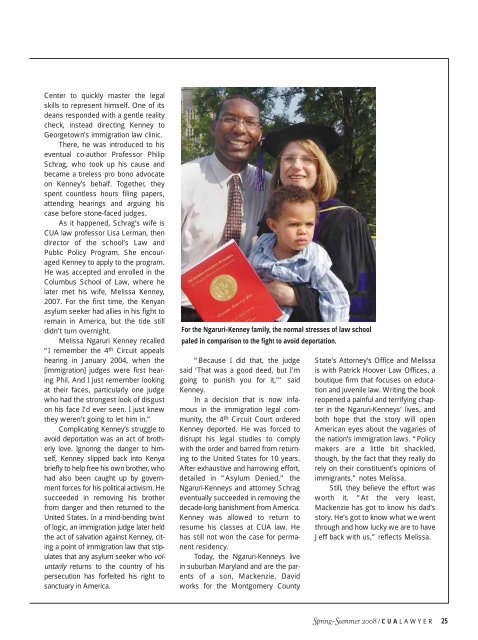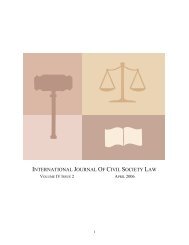Connected Minds,Connected Cultures:\ Connected Minds
Connected Minds,Connected Cultures:\ Connected Minds
Connected Minds,Connected Cultures:\ Connected Minds
- No tags were found...
You also want an ePaper? Increase the reach of your titles
YUMPU automatically turns print PDFs into web optimized ePapers that Google loves.
Center to quickly master the legalskills to represent himself. One of itsdeans responded with a gentle realitycheck, instead directing Kenney toGeorgetown’s immigration law clinic.There, he was introduced to hiseventual co-author Professor PhilipSchrag, who took up his cause andbecame a tireless pro bono advocateon Kenney’s behalf. Together, theyspent countless hours filing papers,attending hearings and arguing hiscase before stone-faced judges.As it happened, Schrag’s wife isCUA law professor Lisa Lerman, thendirector of the school’s Law andPublic Policy Program. She encouragedKenney to apply to the program.He was accepted and enrolled in theColumbus School of Law, where helater met his wife, Melissa Kenney,2007. For the first time, the Kenyanasylum seeker had allies in his fight toremain in America, but the tide stilldidn’t turn overnight.Melissa Ngaruri Kenney recalled“I remember the 4 th Circuit appealshearing in January 2004, when the[immigration] judges were first hearingPhil. And I just remember lookingat their faces, particularly one judgewho had the strongest look of disguston his face I’d ever seen. I just knewthey weren’t going to let him in.”Complicating Kenney’s struggle toavoid deportation was an act of brotherlylove. Ignoring the danger to himself,Kenney slipped back into Kenyabriefly to help free his own brother, whohad also been caught up by governmentforces for his political activism. Hesucceeded in removing his brotherfrom danger and then returned to theUnited States. In a mind-bending twistof logic, an immigration judge later heldthe act of salvation against Kenney, citinga point of immigration law that stipulatesthat any asylum seeker who voluntarilyreturns to the country of hispersecution has forfeited his right tosanctuary in America.For the Ngaruri-Kenney family, the normal stresses of law schoolpaled in comparison to the fight to avoid deportation.“Because I did that, the judgesaid ‘That was a good deed, but I’mgoing to punish you for it,’” saidKenney.In a decision that is now infamousin the immigration legal community,the 4 th Circuit Court orderedKenney deported. He was forced todisrupt his legal studies to complywith the order and barred from returningto the United States for 10 years.After exhaustive and harrowing effort,detailed in “Asylum Denied,” theNgaruri-Kenneys and attorney Schrageventually succeeded in removing thedecade-long banishment from America.Kenney was allowed to return toresume his classes at CUA law. Hehas still not won the case for permanentresidency.Today, the Ngaruri-Kenneys livein suburban Maryland and are the parentsof a son, Mackenzie. Davidworks for the Montgomery CountyState’s Attorney’s Office and Melissais with Patrick Hoover Law Offices, aboutique firm that focuses on educationand juvenile law. Writing the bookreopened a painful and terrifying chapterin the Ngaruri-Kenneys’ lives, andboth hope that the story will openAmerican eyes about the vagaries ofthe nation’s immigration laws. “Policymakers are a little bit shackled,though, by the fact that they really dorely on their constituent’s opinions ofimmigrants,” notes Melissa.Still, they believe the effort wasworth it. “At the very least,Mackenzie has got to know his dad’sstory. He’s got to know what we wentthrough and how lucky we are to haveJeff back with us,” reflects Melissa.Spring–Summer 2008 / C UALAWYER 25
















